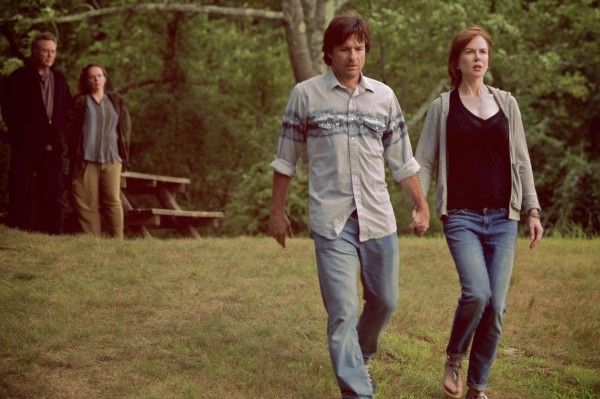There’s a reason that, more often than not, family dramas end up feeling clichéd and too familiar. Most of us have experience with the notion of family, so the genre is inherently relatable, but Hollywood being Hollywood, we are routinely presented with the same story over and over again. Case in point: the overbearing father/mother whose parenting style is then resented by their grown children. This is, on a very simple level, the basic premise for Jason Bateman’s second directorial effort, The Family Fang, but the film is refreshingly unique, offering a droll and unexpected spin on the genre that we all know too well. While tonal inconsistencies and pacing issues keep the film from achieving greatness, it ultimately hits more than it misses and has the guts to stick to its somewhat darker point of view in favor of “making nice.”
Based on the novel by Kevin Wilson and scripted by esteemed playwright David Lindsay-Abaire, The Family Fang tells of the titular Fangs, a family who rose to fame for their edgy performance art pieces led by father Caleb (Christopher Walken), mother Camille (Maryann Plunkett), and two young children. These pieces ranged from the slightly benign, like Caleb dressing up as a cop and tackling his son in the middle of a bank for trying to rob them of lollipops, to the more scandalous—a particular piece walks right up to the line of incest.
In present day, the Fangs have a somewhat distant relationship with one another due in no small part to the performance art ruling their lives as children. Annie (Nicole Kidman) is a well known actress who’s now running into trouble with the tabloids and facing the downside of her fame, while Baxter (played by Bateman) is a semi-successful novelist who’s scrounging for freelance work. When Baxter succumbs to an injury and inadvertently draws the attention of his parents, Annie flies out to meet him so he won’t have to face them alone. But when an attempt by Caleb and Camille to reunite the family for one more piece goes wrong, the parents go missing, leaving Baxter and Annie aimlessly living inside their childhood home and confronting issues long-held dormant.
The story and tone of The Family Fang is very odd, and credit to Bateman for tackling something so ambitious and tricky for his second directorial feature. The film is dryly funny throughout, but a darkness lurks under the surface of most scenes that’s accentuated by dim cinematography from Ken Seng. This tonal dissonance makes for some strange turns along the way, and not all of them work, but the thrust of the movie is carried by strong performances from Kidman, Walken, and especially Bateman.
This is Bateman’s most difficult onscreen role yet, as he’s forced to tap into some repressed issues while maintaining his composure up front. Baxter’s confused emotions regarding his parents are played out nearly entirely on Bateman’s face, and he does a wonderful job of conveying just how messed up Baxter is with a few nuanced expressions. He also does some swell work behind the camera, playing around with different color palettes and visual approaches when delving into flashbacks and clips from a documentary that plays throughout the film.
Pacing issues severely hinder the movie’s middle portion—the story starts to meander and it’s not quite clear exactly where it’s going. This aimlessness makes a couple of the emotional beats less impactful than they may have been, but the film ultimately finishes strong with a confident third act whose gutsiness is a refreshing change of pace in this particular genre.
And while the movie is very much about a family and how selfishness on behalf of parents can do far more damage than may seem possible, the film also has interesting ideas on the nature of art and what delineates pure art from more traditional forms. In the context of the film, the value of the Fangs’ work is hotly debated among critics, with one in particular claiming, “Just because you attach a statement doesn’t make it art.” Caleb rails against forms like painting and photography as not “true” art and too staged, arguing that only something with actual human conditioning in an uncontrolled environment can be considered genuine art.
This is a fascinating dichotomy because in Caleb’s effort to enact “true art” that taps into the core of humanity, he ends up using his children as staged objects, therefore denying them their humanity in the context of the piece. He, in effect, robs them of their childhood, and they’ve spent their entire lives trying to capture something that’s real and human.
The saying goes that you can’t choose your family, but they’re the only one you’ve got. The Family Fang examines core problems that everyone encounters in his or her own family, but with a unique point of view and an admirable steadfastness in its candor. While tonal inconsistences and pacing issues hinder its overall impact, the film remains a curious and engaging piece of art that manages to tap into complex human emotions in a frank manner while avoiding the clichés and pitfalls that plague many other films of the genre.
Rating: B-
Click here for all of our TIFF 2015 coverage thus far or peruse links to our reviews below:
- 45 Years
- Anomalisa
- Baskin
- Black Mass
- The Danish Girl
- The Devil’s Candy
- Dheepan
- Equals
- February
- Green Room
- Hardcore
- Hitchcock/Truffaut
- I Smile Back
- The Iron Giant: Signature Edition
- Kill Your Friends
- Legend
- The Lobster
- Love
- The Martian
- Men & Chicken
- Room
- Sicario
- Spotlight
- Trumbo
- Victoria
- Where to Invade Next


